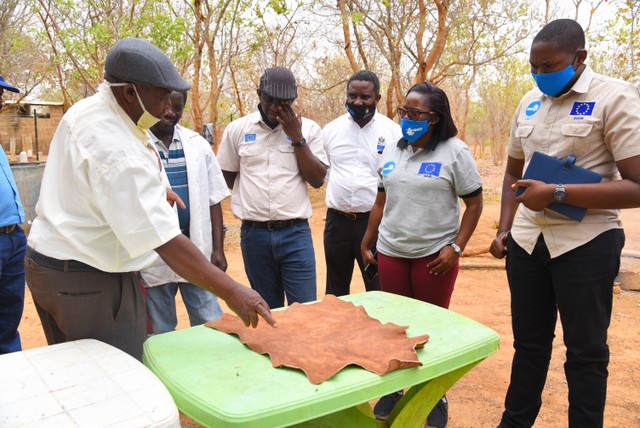
The negative socio-economic impact of COVID-19 has not spared the leather industry in Zambia as the industry is feeling the pinch of the pandemic due to massive disruptions in the way business is done. Several small and medium entrepreneurs in the sector have folded altogether, while some have joined forces to stay afloat.
Industry players say that the confinement of people indoors by COVID-19 had limited movement which led to low utilization of footwear. This has prompted the Zambia Leather Industries Association (ZALIA) to call on its members to utilize the cluster initiative to overcome the challenges associated with the pandemic.
On 6th October 2020, a Monitoring and Evaluation Mission conducted by the COMESA Adjustment Facility (CAF) through its Regional Integration Support Mechanism (RISM) project was in Kafue district of Zambia visiting leather projects.
Speaking at the project site, Chairperson of ZALIA, Mr. Steven Kanyanta said COVID has provided an opportunity for the leather sector to grow exponentially as demand for the local products has increased due to a decline in importation of shoes from other parts of the world.
Mr Kanyanta who accompanied CAF/RISM Coordinator Hope Situmbeko on the mission said that his association has embarked on resuscitating the clusters all over the country to start working together to enhance their productive capacity and meet the current high demand of leather products in the country.
“In as far as COVID 19 has had a negative impact on the leather sector such as lack of raw materials that we source from other parts of the World , we have seen an opportunity to develop our sector and ensure that we produce to meet the market needs in the country and this we shall do through the cluster initiative,” Mr Kanyanta added.
One of the beneficiaries to the RISM support, Edward Mungala described the COVID-19 as a game changer which pushed him out of his shoe manufacturing business and opted to join another shoe-maker in order to earn an income.
Edward who is also a beneficiary of the COMESA Support through the COMESA Adjustment Facility said the skills gained through RISM has enabled him to forge a business partnership to leverage on each other’s strengths.
“I have now learnt that working together is better than alone. I was completely finished because there was no business and I decided to join my friend so we can build the business and its working now but we just need more support in terms of equipment,” Edward said.
During the mission, the team also visited the Kafue Leather Cottage owned by Mr. Wilson Mutale. With vast experience in the leather sector he has trained over 80 farmers in vegetable tanning through the project. The vegetable tanning techniques have enabled reduction of the turnover period from 90 days to just 48 hours making the goods more readily available for the market.

